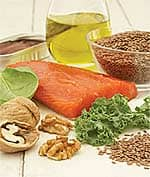Life Extension Magazine®
While most people relentlessly pursue diet after diet to lose weight, often with mixed results, there is one diet that not only helps you safely lose weight but can also dramatically reduce your risk of heart disease as well. In countless studies, a Mediterranean-style diet has been proven to lower inflammatory markers, reduce metabolic syndrome, eliminate many of the risk factors that contribute to cardiovascular disease, and lower one’s exposure to cancer.1-13 In short, this is a diet and a lifestyle that not only can make you look and feel great but can help you live a longer, healthier life at the same time.
In my clinical practice as a preventive cardiologist, I have seen the impressive results of my Miami Mediterranean Diet not only help people lose weight but actually save lives. Characterized by whole grains and legumes, lean protein, fresh fruits and vegetables, and plenty of heart-healthy olive oil, the Mediterranean diet has been clinically proven—again and again—to arrest the degenerative factors that lead to many of our most lethal diseases. The Miami Mediterranean Diet is about preventing cardiovascular disease by reducing inflammation and neutralizing free radicals that lead to heart disease, cancer, and numerous other diseases. Can we defeat cardiovascular disease and its manifestations (heart attack, stroke, peripheral vascular disease)? The answer is yes! And prevention–not intervention–is the key. The Mediterranean Diet RevolutionAs a preventive cardiologist, I have often taken a position that is the polar opposite of many of my colleagues. I firmly believe that we do far too much intervention in this country—invasive procedures like stents, balloon angioplasties, bypass surgeries—and not enough prevention. As doctors, if we seriously invested the time in teaching our patients how to prevent heart disease, we could actually see a significant drop in the amount of cardiovascular mortality in this country. And given that every 36 seconds, someone in America dies of an illness related to cardiovascular disease, there’s clearly plenty of need for better prevention. In recent years, I’ve devoted nearly as much time to lecturing as I have to seeing patients. Traveling all over the world, I eagerly spread the word about the benefits of the Miami Mediterranean Diet. The reason is simple: cardiovascular disease prevention is a topic that is near and dear to my own heart.
My “Eureka” MomentI first became interested in this remarkably healthful diet about a quarter of a century ago. I remember I had just returned home, late one evening, after a full day of performing a half-dozen or so balloon angioplasties on my patients. Exhausted, I sat down to unwind with some reading material, and came across an article written by University of Minnesota scientist, Ansel Keys, PhD.14,15 It described the groundbreaking Seven Countries Study, which established that the dietary patterns of people living in the Mediterranean region were associated with better health and longer life. A middle-aged Greek man, for instance, was 90% less likely to have cardiovascular disease than a comparable man in the West.
That’s when a light bulb went off for me. I thought, “Wait a minute, this is crazy, we’re doing it all wrong!” I had just done one half-dozen interventional procedures, and here was information that could have prevented the problem with something as simple as diet and lifestyle. I had always believed that vascular disease–atherosclerosis—was a metabolic disorder. And this suggested that it required a metabolic solution. So I sat down and typed up 20 to 30 pages describing the diet and lifestyle I wanted my patients to follow. It was a simple patient handout. And guess what? I found that it really worked. Ninety-five percent of my patients were losing weight, lowering their blood pressure, reducing their detrimental low-density lipoprotein (LDL), raising their beneficial high-density lipoprotein (HDL), and getting healthier. Eventually, my intervention-oriented colleagues started asking, “Why aren’t you sending us more cases?” They wondered why I wasn’t sending patients to the cardiac catheterization lab anymore. The simple answer is that my patients were getting better—without invasive procedures like stents, angioplasties, or bypass surgeries. It was revolutionary! I’ve come to believe that we’re marching down the wrong path in the United States. We have this “quick-fix” attitude. If a patient develops cardiovascular disease, our treatment is to put in a stent, or to do a triple-bypass operation. While emergency coronary intervention with stent placement and other forms of intervention is often appropriate and necessary in unstable coronary syndromes or for patients in the throes of a heart attack, intervention has never been shown to decrease the risk of a future heart attack or prolong life compared with lifestyle changes and medical therapy in stable patients with coronary artery disease. In fact there’s no evidence that putting in a stent or performing a surgical bypass prevents future heart attacks—none. But we keep on doing invasive interventions on stable patients. What we’re doing is wrong. It’s much better to put a patient on the Mediterranean diet and lifestyle and medical therapy (as needed) to successfully address the underlying metabolic derangements. Originally I called my handout the “Cardiovascular Disease Prevention Diet and Lifestyle,” but soon word got out, and people all over the country were calling my office asking for my “Miami Mediterranean Diet.” I gladly sent copies, and the idea for a book was born. It was clear that the information contained in my handout was changing people’s lives. In order to provide as much guidance as possible, I decided to write the Miami Mediterranean Diet in order to provide a working blueprint for anyone who wants to lose weight and reduce their exposure to coronary heart disease, hypertension, diabetes, Alzheimer’s disease, and cancer. As I watched people change their eating habits and increase their health, I knew that it was time to update the book and have just released the 2008 expanded edition of the Miami Mediterranean Diet. The benefits of this eating plan go beyond good health—in my experience, if you are healthy on the inside, you are going to look fantastic on the outside, too!
Ancient Traditions, Modern DietBut what exactly is the Mediterranean diet? At least one researcher has defined it as, “the dietary pattern found in the olive-growing areas of the Mediterranean region, in the late ‘50s and early ‘60s, when the consequences of World War II were overcome, but the fast-food culture had not reached the area yet.”16 But, as another leading researcher points out, “the term “Mediterranean diet,” implying that all Mediterranean people have the same diet, is a misnomer. The countries around the Mediterranean basin have different diets, religions and cultures.”17 So what I did, in developing the Miami Mediterranean diet, was to combine elements from all the best of those cultures and cuisines, guided by both tradition and modern science. The result is a diet that reflects the ancient dietary traditions of the Mediterranean basin, adapted for a modern American public in desperate need of nutritional guidance. Although I’ve successfully leveraged the principles of the Mediterranean diet in my medical practice for more than two decades, it seems the world has only recently begun to notice what my patients have known for years–this is a diet and lifestyle that works. And scientific validation of the diet’s health claims has accumulated dramatically in the past decade. In the two short years since the publication of the first edition of the Miami Mediterranean Diet, for instance, numerous clinical trials published in the medical literature have confirmed my message–this diet works; this diet saves lives.1,3-13,18-23 Few, if any other diets, can claim as much with equal authority. For thousands of years the people of the Mediterranean region have benefitted from this healthful lifestyle. Of course, they didn’t set out to adopt a specific diet with carefully targeted benefits. Rather, they drew sustenance from the land and the sea as their forbears had always done. They cultivated olive and fruit trees and vegetable and herb gardens, raised sheep and goats, and harvested grains and the bounty of the sea. They were only doing what seemed natural, but as it happens, theirs is a uniquely healthful diet and lifestyle. Extra-virgin olive oil, for instance, is remarkably heart healthy since it lowers harmful LDL. It also helps to prevent oxidation of LDL through the action of its abundant polyphenols.5,6,8,24,25 Likewise, fresh vegetables, fruits, nuts, beans, fish, and red wine (consumed in moderation) all contribute to the health benefits of the Mediterranean diet. Red meat is infrequently consumed, and even then, it is ordinarily used simply to flavor dishes such as soups and stews. Recent rigorous science has proven it. From weight loss to improved lipid profiles and significantly reduced risk of developing a variety of cancers, osteoporosis, stroke, and even Alzheimer’s disease,3,4,9,11,12,21,26-30 adherents of the Mediterranean diet reap numerous long-term benefits that are virtually guaranteed to deliver longer, healthier life. Of course, it’s not all due to food alone. My book also emphasizes the importance of exercise and stress reduction for maximum health benefits. The Mediterranean lifestyle includes daily exercise, which is as important to good health as a proper diet. Stress reduction is another integral component of this heart-friendly regimen. Exercise, diet and stress reduction are complementary activities in my New World version of this longevity-inducing Old World lifestyle. “The Mediterranean diet and lifestyle can help reduce our level of stress,” I wrote, in the original Miami Mediterranean Diet. “Meals are enjoyed with family and friends in a relaxed fashion, with ample time for friendly conversation. Often a short nap or ‘siesta’ follows the meal.” And as un-American as a mid-day nap may sound, brief naps may actually improve both productivity and overall health.31,32
Bountiful Evidence: the Inflammation ConnectionWhy does the Mediterranean diet work? One theory is that this diet significantly reduces saturated fat consumption and eliminates trans fat intake, thereby reducing atherosclerosis and significantly improving cardiovascular health. Another is that it reduces inflammation. Still another is that it supplies significant quantities of free radical-fighting antioxidants. Perhaps all these factors play a role. Extensive research has certainly demonstrated the role of inflammation in the development and progression of degenerative diseases, such as heart disease, cancer, and diabetes.23,33-36 Key components of the Mediterranean diet have been shown to be anti-inflammatory. Among these are omega-3 fatty acids from fish.37,38 In contrast, the typical American diet, with its high content of saturated fat, trans fatty acids, and omega-6 fatty acids, is pro-inflammatory.35,39-45
The results of such a diet became apparent late last year, when British researchers published the findings from a decade-long prospective study on a large sample of the aging US population. By gleaning information about diet and mortality from the National Institutes of Health-AARP Diet and Health Study scientists were able to determine the extent to which conforming to a classic Mediterranean diet influences life span. They discovered that “the Mediterranean diet was associated with reduced all-cause and cause-specific mortality.” In women, the greater the conformity to the tenets of the diet, the greater the benefits, including, “decreased risks that ranged from 12% for cancer mortality to 20% for all-cause mortality.”3 This is a remarkable validation of a particular dietary pattern, especially given the study’s robust sample size of more than 380,000 American men and women. Another large study published by Greek researchers last year documented improvements in insulin sensitivity, as well as decreases in cholesterol levels and systolic blood pressure, even among overweight and obese men and women who at least came “close” to sticking to the Mediterranean diet.4 The study yielded data showing that subjects with the greatest adherence to the classic Mediterranean diet were more likely to have normal blood glucose metabolism. This implies that this diet is also protective against type 2 diabetes. A previous report by the same Greek research team concluded that greater adherence to the Mediterranean diet was associated with a reduced incidence of obesity.12 In other words, the Mediterranean diet is slimming, not fattening. Of course, my patients and I have known that for years.
| |||||||||||||
ConclusionThe traditional Mediterranean diet has long been associated with long life span and a decreased risk of degenerative disease, and modern science now confirms the vast benefits of this style of eating. Now you too can reap the benefits of this traditional diet, using the guidelines and menu plans outlined in the Miami Mediterranean Diet.
Delicious and satisfying, the Miami Mediterranean diet has helped many individuals to improve their cardiovascular health, avoid invasive procedures, lose weight, avert diabetes and metabolic syndrome, and maintain their youthful vitality. I hope you’ll join us in following this healthful diet and lifestyle. It could just save your life.
If you have any questions on the scientific content of this article, please call a Life Extension Health Advisor at 1-800-226-2370. Michael Ozner, MD, FACC, FAHA is one of America’s leading advocates for heart disease prevention and a well-known regional and national speaker in the field of preventive cardiology. Dr. Ozner is a board-certified cardiologist, a fellow of the American College of Cardiology and American Heart Association, medical director of the Center for Prevention and Wellness at Baptist Health South Florida, and a clinical assistant professor of medicine and cardiology at the University of Miami Miller School of Medicine. In addition, he is the medical director for the Cardiovascular Prevention Institute of South Florida and symposium director for “Cardiovascular Disease Prevention,” an annual international meeting highlighting advances in preventive cardiology. Dr. Ozner is the past president of the American Heart Association of Miami. For more information, visit www.cardiacoz.com.
| |||||
| References | |||||
1. Dai J, Miller AH, Bremner JD, et al. Adherence to the mediterranean diet is inversely associated with circulating interleukin-6 among middle-aged men: a twin study. Circulation. 2008 Jan 15;117(2):169-75. 2. Panagiotakos DB, Arapi S, Pitsavos C, et al. The relationship between adherence to the Mediterranean diet and the severity and short-term prognosis of acute coronary syndromes (ACS): The Greek Study of ACS (The GREECS). Nutrition. 2006 Jul;22(7-8):722-30. 3. Mitrou PN, Kipnis V, Thiebaut AC, et al. Mediterranean dietary pattern and prediction of all-cause mortality in a US population: results from the NIH-AARP Diet and Health Study. Arch Intern Med. 2007 Dec 10;167(22):2461-8. 4. Tzima N, Pitsavos C, Panagiotakos DB, et al. Mediterranean diet and insulin sensitivity, lipid profile and blood pressure levels, in overweight and obese people; the Attica study. Lipids Health Dis. 2007;622. 5. Trichopoulou A, Dilis V. Olive oil and longevity. Mol Nutr Food Res. 2007 Oct;51(10):1275-8. 6. Fito M, de la TR, Covas MI. Olive oil and oxidative stress. Mol Nutr Food Res. 2007 Oct;51(10):1215-24. 7. Esposito K, Ciotola M, Giugliano D. Mediterranean diet and the metabolic syndrome. Mol Nutr Food Res. 2007 Oct;51(10):1268-74. 8. Perez-Jimenez F, Ruano J, Perez-Martinez P, Lopez-Segura F, Lopez-Miranda J. The influence of olive oil on human health: not a question of fat alone. Mol Nutr Food Res. 2007 Oct;51(10):1199-208. 9. Puel C, Coxam V, Davicco MJ. Mediterranean diet and osteoporosis prevention. Med Sci (Paris). 2007 Aug;23(8-9):756-60. 10. Rossi M, Negri E, Bosetti C, et al. Mediterranean diet in relation to body mass index and waist-to-hip ratio. Public Health Nutr. 2008 Feb;11(2):214-7. 11. Burgener SC, Buettner L, Coen BK, et al. Evidence supporting nutritional interventions for persons in early stage Alzheimer’s disease (AD). J Nutr Health Aging. 2008 Jan;12(1):18-21. 12. Panagiotakos DB, Chrysohoou C, Pitsavos C, Stefanadis C. Association between the prevalence of obesity and adherence to the Mediterranean diet: the ATTICA study. Nutrition. 2006 May;22(5):449-56. 13. Panagiotakos DB, Tzima N, Pitsavos C, et al. The association between adherence to the Mediterranean diet and fasting indices of glucose homoeostasis: the ATTICA Study. J Am Coll Nutr. 2007 Feb;26(1):32-8. 14. Vanitallie TB. Ancel Keys: a tribute. Nutr Metab (Lond). 2005 Feb 14;2(1):4. 15. Noah A, Truswell AS. There are many Mediterranean diets. Asia Pac J Clin Nutr. 2001;10(1):2-9. 16. Trichopoulou A. Mediterranean diet: the past and the present. Nutr Metab Cardiovasc Dis. 2001 Aug;11(4 Suppl):1-4. 17. Simopoulos AP. The Mediterranean diets: What is so special about the diet of Greece? The scientific evidence. J Nutr. 2001 Nov;131(11 Suppl):3065S-73S. 18. McKellar G, Morrison E, McEntegart A, et al. A pilot study of a Mediterranean-type diet intervention in female patients with rheumatoid arthritis living in areas of social deprivation in Glasgow. Ann Rheum Dis. 2007 Sep;66(9):1239-43. 19. Fito M, Guxens M, Corella D, et al. Effect of a traditional Mediterranean diet on lipoprotein oxidation: a randomized controlled trial. Arch Intern Med. 2007 Jun 11;167(11):1195-203. 20. Esposito K, Ciotola M, Giugliano F, et al. Mediterranean diet improves sexual function in women with the metabolic syndrome. Int J Impot Res. 2007 Sep;19(5):486-91. 21. de Lorgeril M, Salen P. Mediterranean diet and n-3 fatty acids in the prevention and treatment of cardiovascular disease. J Cardiovasc Med (Hagerstown.). 2007 Sep;8 Suppl 1S38-S41. 22. Trichopoulou A, Bamia C, Norat T, et al. Modified Mediterranean diet and survival after myocardial infarction: the EPIC-Elderly study. Eur J Epidemiol. 2007 Dec;22(12):871-81. 23. Giugliano D, Esposito K. Mediterranean diet and metabolic diseases. Curr Opin Lipidol. 2008 Feb;19(1):63-8. 24. Waterman E, Lockwood B. Active components and clinical applications of olive oil. Altern Med Rev. 2007 Dec;12(4):331-42. 25. Caramia G. Virgin olive oil. From legend to scientific knowledge of the nutraceutical aspects. Pediatr Med Chir. 2006;28(1-3):9-23. 26. Spence JD. Nutrition and stroke prevention. Stroke. 2006 Sep;37(9):2430-5. 27. Scarmeas N, Luchsinger JA, Mayeux R, Stern Y. Mediterranean diet and Alzheimer disease mortality. Neurology. 2007 Sep 11;69(11):1084-93. 28. Scarmeas N, Stern Y, Mayeux R, Luchsinger JA. Mediterranean diet, Alzheimer disease, and vascular mediation. Arch Neurol. 2006 Dec;63(12):1709-17. 29. Luchsinger JA, Noble JM, Scarmeas N. Diet and Alzheimer’s disease. Curr Neurol Neurosci Rep. 2007 Sep;7(5):366-72. 30. Pitsavos C, Panagiotakos DB, Tzima N, et al. Diet, exercise, and C-reactive protein levels in people with abdominal obesity: the ATTICA epidemiological study. Angiology. 2007 Apr;58(2):225-33. 31. Dhand R, Sohal H. Good sleep, bad sleep! The role of daytime naps in healthy adults. Curr Opin Pulm Med. 2006 Nov;12(6):379-82. 32. Brooks A, Lack L. A brief afternoon nap following nocturnal sleep restriction: which nap duration is most recuperative? Sleep. 2006 Jun 1;29(6):831-40. 33. Thakore AH, Guo CY, Larson MG, et al. Association of multiple inflammatory markers with carotid intimal medial thickness and stenosis (from the Framingham Heart Study). Am J Cardiol. 2007 Jun 1;99(11):1598-602. 34. Packard RR, Libby P. Inflammation in atherosclerosis: from vascular biology to biomarker discovery and risk prediction. Clin Chem. 2008 Jan;54(1):24-38. 35. Patel S, Celermajer DS, Bao S. Atherosclerosis-Underlying inflammatory mechanisms and clinical implications. Int J Biochem Cell Biol. 2007 Dec 7. 36. Bonomini F, Tengattini S, Fabiano A, Bianchi R, Rezzani R. Atherosclerosis and oxidative stress. Histol Histopathol. 2008 Mar;23(3):381-90. 37. Calder PC. Immunomodulation by omega-3 fatty acids. Prostaglandins Leukot Essent Fatty Acids. 2007 Nov;77(5-6):327-35. 38. Serhan CN, Chiang N. Endogenous pro-resolving and anti-inflammatory lipid mediators: a new pharmacologic genus. Br J Pharmacol. 2007 Oct 29. 39. de Lorgeril M. Essential polyunsaturated fatty acids, inflammation, atherosclerosis and cardiovascular diseases. Subcell Biochem. 2007;42:283-97. 40. Simopoulos AP. Evolutionary aspects of diet, the omega-6/omega-3 ratio and genetic variation: nutritional implications for chronic diseases. Biomed Pharmacother. 2006 Nov;60(9):502-7. 41. Salas-Salvado J, Garcia-Arellano A, Estruch R, et al. Components of the mediterranean-type food pattern and serum inflammatory markers among patients at high risk for cardiovascular disease. Eur J Clin Nutr. 2007 Apr 18. 42. Schmitz G, Ecker J. The opposing effects of n-3 and n-6 fatty acids. Prog Lipid Res. 2007 Dec 25. 43. Harvey KA, Arnold T, Rasool T, et al. Trans-fatty acids induce pro-inflammatory responses and endothelial cell dysfunction. Br J Nutr. 2007 Oct 10;1-9. 44. Willett WC. Trans fatty acids and cardiovascular disease-epidemiological data. Atheroscler Suppl. 2006 May;7(2):5-8. 45. Alipour A, van Oostrom AJ, Izraeljan A, et al. Leukocyte Activation by Triglyceride-Rich Lipoproteins. Arterioscler Thromb Vasc Biol. 2008 Jan 24. 46. Chatzi L, Apostolaki G, Bibakis I, et al. Protective effect of fruits, vegetables and the Mediterranean diet on asthma and allergies among children in Crete. Thorax. 2007 Aug;62(8):677-83. 47. Garcia-Marcos L, Canflanca IM, Garrido JB, et al. Relationship of asthma and rhinoconjunctivitis with obesity, exercise and Mediterranean diet in Spanish schoolchildren. Thorax. 2007 Jun;62(6):503-8. 48. Trichopoulou A, Costacou T, Bamia C, Trichopoulos D. Adherence to a Mediterranean Diet and Survival in a Greek Population. N Engl J Med 2003;348:2599-2608. 49. Carruba G, Granata OM, Pala V, et al. A traditional Mediterranean diet decreases endogenous estrogens in healthy postmenopausal women. Nutr Cancer. 2006;56(2):253-9. 50. Menendez JA, Lupu R. Mediterranean dietary traditions for the molecular treatment of human cancer: anti-oncogenic actions of the main olive oil’s monounsaturated fatty acid oleic acid (18:1n-9). Curr Pharm Biotechnol. 2006 Dec;7(6):495-502. 51. Salvini S, Sera F, Caruso D, et al. Daily consumption of a high-phenol extra-virgin olive oil reduces oxidative DNA damage in postmenopausal women. Br J Nutr. 2006 Apr;95(4):742-51. 52. Owen RW, Haubner R, Wurtele G, Hull E, Spiegelhalder B, Bartsch H. Olives and olive oil in cancer prevention. Eur J Cancer Prev. 2004 Aug;13(4):319-26. 53. Fini L, Hotchkiss E, Fogliano V, et al. Chemopreventive properties of pinoresinol-rich olive oil involve a selective activation of the ATM-p53 cascade in colon cancer cell lines. Carcinogenesis. 2008 Jan;29(1):139-46. 54. Brown MD, Hart CA, Gazi E, Bagley S, Clarke NW. Promotion of prostatic metastatic migration toward human bone marrow stoma by Omega 6 and its inhibition by Omega 3 PUFAs. Br J Cancer. 2006 Mar 27;94(6):842-53. 55. Wu M, Harvey KA, Ruzmetov N, et al. Omega-3 polyunsaturated fatty acids attenuate breast cancer growth through activation of a neutral sphingomyelinase-mediated pathway. Int J Cancer. 2005 Nov 10;117(3):340-8. 56. De Caterina R, Massaro M. Omega-3 fatty acids and the regulation of expression of endothelial pro-atherogenic and pro-inflammatory genes. J Membr Biol. 2005 Jul;206(2):103-16. 57. Trichopoulou A, Lagiou P, Kuper H, Trichopoulos D. Cancer and Mediterranean dietary traditions. Cancer Epidemiol Biomarkers Prev. 2000 Sep;9(9):869-73. 58. Esposito K, Marfella R, Ciotola M, et al. Effect of a Mediterranean-style diet on endothelial dysfunction and markers of vascular inflammation in the metabolic syndrome: a randomized trial. JAMA. 2004 Sep 22;292(12):1440-6. 59. Bondia-Pons I, Schröder H, Covas MI, et al. Moderate consumption of olive oil by healthy European men reduces systolic blood pressure in non-Mediterranean participants. J Nutr. 2007 Jan;137(1):84-7. 60. Chen YD, Coulston AM, Zhou MY, Hollenbeck CB, Reaven GM. Why do low-fat high-carbohydrate diets accentuate postprandial lipemia in patients with NIDDM? Diabetes Care. 1995 Jan;18(1):10-6. 61. Singh RB, Dubnov G, Niaz MA, et al. Effect of an Indo-Mediterranean diet on progression of coronary artery disease in high risk patients (Indo-Mediterranean Diet Heart Study): a randomised single-blind trial. Lancet. 2002 Nov 9;360(9344):1455-61. 62. Castagnetta L, Granata OM, Cusimano R, et al. The Mediet Project. Ann NY Acad Sci. 2002 Jun;963:282-9. 63. Detopoulou P, Panagiotakos DB, Antonopoulou S, Pitsavos C, Stefanadis C. Dietary choline and betaine intakes in relation to concentrations of inflammatory markers in healthy adults: the ATTICA study. Am J Clin Nutr. 2008 Feb;87(2):424-30. 64. Zeisel SH. Is there a new component of the Mediterranean diet that reduces inflammation? Am J Clin Nutr. 2008 Feb;87(2):277-8. 65. Willett WC. The Mediterranean diet: science and practice. Public Health Nutr. 2006;9(1A):105-10. 66. Marrugat J, Covas MI, Fito M, et al. Effects of differing phenolic content in dietary olive oils on lipids and LDL oxidation—a randomized controlled trial. Eur J Nutr. 2004 Jun;43(3):140-7. 67. Weinbrenner T, Fito M, de la Torre R, et al. Olive oils high in phenolic compounds modulate oxidative/antioxidative status in men. J Nutr. 2004 Sep;134(9):2314-21. 68. Gimeno E, Fito M, Lamuela-Raventos RM, et al. Effect of ingestion of virgin olive oil on human low-density lipoprotein composition. Eur J Clin Nutr. 2002 Feb;56(2):114-20. 69. Fito M, Gimeno E, Covas MI, et al. Postprandial and short-term effects of dietary virgin olive oil on oxidant/antioxidant status. Lipids. 2002 Mar;37(3):245-51. 70. Estruch R, Martínez-González MA, Corella D, et al. Effects of a Mediterranean-style diet on cardiovascular risk factors: a randomized trial. Ann Intern Med. 2006 Jul 4;145(1):1-11. |






